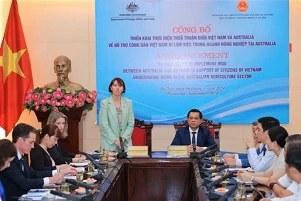
Australia to allow up to 1,000 Vietnamese workers in agricultural sector
Latest
 |
| Australia to allow up to 1,000 Vietnamese workers in agricultural sector: At the event announcing the implementation of support measures for Vietnamese citizens under the programme. (Source: VNA) |
On September 6, the Ministry of Labour, Invalids and Social Affairs and the Australian Embassy announced the implementation of support measures for Vietnamese citizens under this programme.
Accordingly, participating Vietnamese workers can undertake short-term work (lasting from six to nine months) or long-term assignments (from one to four years). The job positions available require only low to semi-skilled agricultural work, including crop cultivation, meat processing, aquaculture (including fish farming), and forestry.
In early March, the prime ministers of both countries jointly announced the plan for the implementation of the programme. The selection of Vietnamese service providers for sending workers abroad and Australian employers participating in the programme is set to take place in September, with the choosing of the former coordinated by the ministry and Australian government.
In the first year of the programme, one public service unit and up to six enterprises specialising in sending Vietnamese workers overseas will be selected. Recruitment fees will be paid by Australian employers to the Vietnamese service providers.
Deputy Minister of Labour, Invalids and Social Affairs Nguyen Ba Hoan stated that labour cooperation is a crucial component of the Vietnam-Australia comprehensive strategic partnership. He noted that this agreement would meet the wishes of Vietnamese workers seeking to work in Australia to improve their language skills, gain knowledge, and enhance technical expertise in agriculture while earning higher incomes. At the same time, it would also cater to relevant demand from Australian employers.
Australian Deputy Ambassador Renée Deschamps highlighted the significance of this cooperative programme for both sides. The nations are committed to ensuring the safety of participating workers and minimising risks related to fraud, unethical recruitment practices, and labour exploitation, she said.

























